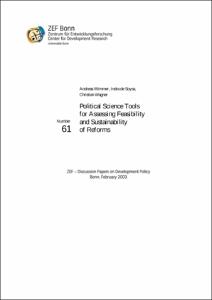Wimmer, Andreas; de Soysa, Indra; Wagner, Christian: Political science tools for assessing feasibility and sustainability of reforms. Bonn: Center for Development Research (ZEF), University of Bonn, 2003. In: ZEF-Discussion Papers on Development Policy, 61.
Online-Ausgabe in bonndoc: https://hdl.handle.net/20.500.11811/12333
Online-Ausgabe in bonndoc: https://hdl.handle.net/20.500.11811/12333
@techreport{handle:20.500.11811/12333,
author = {{Andreas Wimmer} and {Indra de Soysa} and {Christian Wagner}},
title = {Political science tools for assessing feasibility and sustainability of reforms},
publisher = {Center for Development Research (ZEF), University of Bonn},
year = 2003,
month = feb,
series = {ZEF-Discussion Papers on Development Policy},
volume = 61,
note = {We were asked by the Independent Evaluation Office to outline political science methods for assessing the chances of reform implementation in an ex-ante fashion. We agreed to illustrate how these tools ‘work’ by using Pakistan as a case study. The recent literature on IMF-sponsored reforms points out that successful implementation not only depends on the nature and severity of the economic crisis and on the design of the reforms, but very much also on the political economy of reform politics. We have identified the following as salient political factors for identifying chances of reform success:
- the power of sections of the economy and polity that will lose from effective implementation;
- the political independence of reform-minded branches of government vis-à-vis politicians that depend on popular support;
- the institutional capacity to implement reform;
- a high degree of acceptance of the reforms among the major stakeholders (the ‘ownership’ factor).
We have designed three tools that help forecast how these factors will develop in the future. Each tool comprises three dimensions of analysis:
- how these factors will develop after signing an agreement, given visible trends in the immediate past (trend extrapolation);
- how these factors would be influenced by an effective reform implementation (impact analysis);
- how other political framework conditions will evolve and what impact this may have for the reform prospects (scenario building).},
url = {https://hdl.handle.net/20.500.11811/12333}
}
author = {{Andreas Wimmer} and {Indra de Soysa} and {Christian Wagner}},
title = {Political science tools for assessing feasibility and sustainability of reforms},
publisher = {Center for Development Research (ZEF), University of Bonn},
year = 2003,
month = feb,
series = {ZEF-Discussion Papers on Development Policy},
volume = 61,
note = {We were asked by the Independent Evaluation Office to outline political science methods for assessing the chances of reform implementation in an ex-ante fashion. We agreed to illustrate how these tools ‘work’ by using Pakistan as a case study. The recent literature on IMF-sponsored reforms points out that successful implementation not only depends on the nature and severity of the economic crisis and on the design of the reforms, but very much also on the political economy of reform politics. We have identified the following as salient political factors for identifying chances of reform success:
- the power of sections of the economy and polity that will lose from effective implementation;
- the political independence of reform-minded branches of government vis-à-vis politicians that depend on popular support;
- the institutional capacity to implement reform;
- a high degree of acceptance of the reforms among the major stakeholders (the ‘ownership’ factor).
We have designed three tools that help forecast how these factors will develop in the future. Each tool comprises three dimensions of analysis:
- how these factors will develop after signing an agreement, given visible trends in the immediate past (trend extrapolation);
- how these factors would be influenced by an effective reform implementation (impact analysis);
- how other political framework conditions will evolve and what impact this may have for the reform prospects (scenario building).},
url = {https://hdl.handle.net/20.500.11811/12333}
}






